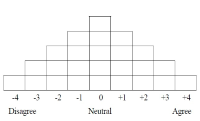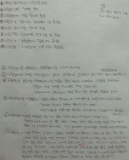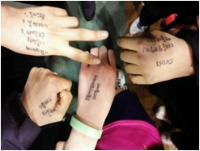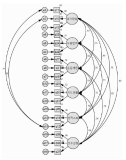Purpose The purpose of this study was to develop the Emotional Intelligence Scale in Sport Coaching(EISSC) based on the emotional intelligence trait model. Methods The participants were 236 professional sports coaches by the purposive sampling methods via e-mails. 48 preliminary items were developed by literature review among expert panels. Then, a total of 40 items were selected after the item-analysis. Exploratory factor analysis was conducted for construct validity and criterion validity was evaluated by Person’s correlation with coaching efficacy scale and general emotional intelligence scale. An internal consistency, Cronbach's alpha coefficient, was used to see the reliability. Results The results of exploratory factor analysis presented a six sub-structure factors (Self-awareness, Awareness of others, Optimism, Utilization of emotion, Emotion regulation, Social skills) with 20 items, which explained 68.49% of the total variance. Criterion-related validity was supported by correlations with in coaching efficacy(r=.713) and general emotional intelligence(r=.647). Reliabilities were secured with Cronbach’s alpha coefficient .854 for the total 20 items. Conclusions The EISSC can be used to provide an valid measure of emotional ability of coaches in sport.
PURPOSE The purpose of this study was to validate the Korean version of Coaching Life Skills in Sport Questionnaire (KCLSS-Q). METHODS Substantive, structural, and external stages were undertaken to address the purpose of this study. At the substantive stage, the scale was translated by discussing with an expert panel and testing item clarity. Ten coaches (9 males, Mage=33.80, SD=4.21) participated in the item clarity test. At the structural stage, descriptive statistics, exploratory factor analysis (EFA), and confirmatory factor analysis (CFA) were conducted. A total of 249 (214 male, Mage=34.18, SD=6.82) and 232 coaches (186 male, Mage=34.26, SD=7.69) participated in the EFA and CFA, respectively. At the external stage, correlation analysis using other scales (emotional intelligence in sport coaching, EISSC) was conducted to examine concurrent validation. A total of 130 copies of the CFA data were randomly extracted and used for this stage. RESULTS For the EFA, the scale extracted five factors with 27 items. In the CFA, however, five factors with 26 items were identified as an appropriate structure. Finally, the relationships of all sub-factors between KCLSS-Q and EISSC were statistically significant in the correlation analysis. CONCLUSIONS KCLSS-Q should reasonably consists of nine items on structuring and facilitating a positive sport climate, five on understanding life skills, four on practicing life skills, five on understanding life skills transfer, and three on practicing life skills transfer. KCLSS-Q can be used as a valid measure to evaluate the coaching life skills of Korean coaches.

Purpose The present study explores educational values of professional coaches from perspectives as educators while they are giving the players sports coaching. Since free agent system was introduced in 1999 at Korean Baseball Organization(KBO) league, the socio-economical differences between players and coaches are getting bigger and bigger. In this situation, professional coaches tend to have more difficulties in interacting with the players. The study focuses on looking into professional coaches' educational agony and reward. Also, it highlights their educational values as educators rather than coaches. Methods Two professional baseball coaches and a TV commentator participated in the study: all past professional players, and professional coaches for more than 10 years. The researchers collected data through semi-structured in-depth interviews; each participant was interviewed three times. The researchers recorded and transcribed all of the interviews; then, the researchers reread the interview transcripts and inductively produced codes for themes whenever emergent codes appeared. Verbatim quotations from the interviews are excerpted in the present research report. Results The findings indicate that, first, the participants are all highly motivated in giving lessons to the players. They all helped the players overcome the difficulties and be good players. They emphasized the importances of endeavors and attitudes during their lessons to be well-received by the players. Second, the participants agreed that good coaches should have the ability to find the potentials of the players and have personality to gain the players' trust. They always have to work and study hard to keep expertises. Conclusions This study argues that the participants are playing their roles in a sport coaching area not only as coaches, but also as educators.


Purpose The purpose of this study is to conduct a typological classification of female recreational sport participants' coaching experience. Methods Q methodology was conducted using 25 Q-samples and 25 P-samples. Data were analyzed using PQmethod software. Results Four types were categorized: communication and character-oriented (I), function and immersion-oriented (II), process and fun-oriented (III), and function and inclusion-oriented (IV). These types were re-categorized as 'non-functional value-oriented (I, III)' and 'functional value-oriented (II, IV)'. Conclusion This study also made efforts to explore the value and norm that female participants expect from sport participation, which provided a variety of perspectives on social, psychological and philosophical discussions about woman sport. In addition, each type and its characteristics can be used as meaningful basic data in teaching method (coaching theory) for woman sport.

PURPOSE Sport pedagogy (SP) has established itself as a subdiscipline in Human Movement Studies since the 1970s. It has become an academic labyrinth as a result of its rapid flourishing. Most researchers are extremely confused about this disorderly research complex. This study aimed to evaluate the characteristics of SP in stages in the western (mostly English speaking) countries. METHODS Analysis of literature published in English from 1990 to 2022. RESULTS The developmental versions were divided as follows: SP1.0 is positivistic in nature, SP2.0 is multi-paradigmatic as it includes all paradigms, and SP3.0 (current version). Many academic journals have been launched, and a variety of books on divergent topics are being published. Currently, research has exploded. In SP3.0, research performed by British scholars are notable in terms of number and quality, overpowering those by scholars in the USA and other countries. Youth sport and sport coaching are regarded as new legitimate areas. Additionally, signs for SP4.0 have been indicated. CONCLUSIONS In order to find way outs in the SP labyrinth, it is necessary to recognize the current research trends in international SP.
PURPOSE This study analyzed the relationship among coaching behaviors, motivational climate, sports competence, effort, and failure tolerance as perceived by high school athletes. Additionally, it examined whether motivational climate, competence, and effort mediate the relationship between coaching behaviors and failure tolerance. METHODS Using questionnaires measuring autonomy-supportive coaching behavior, controlling coaching behavior, motivational climate, sports competence, effort, and failure tolerance, 365 high school athletes were surveyed. Using SPSS 28.0 and Amos 28.0 software, descriptive statistics and structural equation modeling were conducted along with the following types of analyses: reliability, correlation, confirmatory factor, convergent validity, and discriminant. Additionally, the bootstrap method was used to verify serial multiple mediating effects. RESULTS Autonomy-supportive behavior had a significant positive effect 1) on motivational climate, sports competence, and effort and 2) on failure tolerance. 3) Controlling coaching behavior had a significant negative effect on motivational climate and sports competence. 4) Motivational climate and 5) sports competence both had a significant positive effect on effort. 6) Effort had a significant positive effect on failure tolerance. Last, in the relationship between autonomy-supportive behavior and failure tolerance, motivational climate, sports competence, and effort showed partial mediating effects. CONCLUSIONS This study confirms the importance of coaches’ autonomy-supportive behavior in determining failure tolerance among adolescent athletes. Based on this information, counseling (educational) programs aimed at enhancing performance can be developed and provided in sports settings, thus fostering success among athletes.
Purpose The purpose of this study lies in: 1) clarifying what constitutes coaching ethics; 2) providing a theory to set up a coaching ethics in Korea; 3) and offer a direction to coaching ethics based on its normative traits. Methods In order to achieve this purpose, the following has been done: 1) a review of existing literature has been done to analyze the relationship between professionalism and ethics in coaching and explicate the concept and necessity of coaching ethics; 2) an effort has been made to answer such questions as “why and how much should a coach be ethical?”; “How should a coach be ethically evaluated?”; 3) An analysis of ethical responsibility embedded in coaching has been done, focusing on four ethical theories: Kantian categorical imperative, Aristotelian phronesis, Simon’s broad internalism, and Morgan’s conventionalism. Results This study reviews prior literature considering the relationship between professionalism and ethics in coaching and offers theoretical evidence to explain coaching ethics and its normative aspect. This will help resolve complicated ethical predicaments arising in the field. Conclusions This study emphasizes the role of coaches to improve fairness and wholesomeness in the field of sport, as well as suggests a coaching ethics required of a profession with internal regulations. Coaching ethics not only increases a sense of responsibility on the part of coaches but helps create a virtuous circle in which coaches’ ethical sensibility is reproduced in athletes as well. All in all, coaching ethics can stop important qualities of sport from deteriorating due to commercialism and the winner-takes-all attitude prevalent in sport today and contribute to a fair and wholesome sporting culture.

Values, such as development and social responsibilities, are added on victory-oriented Korean sport. Those change of values are along with discussions regarding improvement of players’ training environment, however, discussions on improvement of players’ training environment so far rather focused on ideological concepts, such as players’ holistic human development and human rights, therefore, there was a lack of discussion on practical training methods or teaching methods. This study focused on mental coaching as a specific method for improvement of players’ training environment. Mental coaching provides players with performance enhancement, personal growth, and self-actualization utilizing mental training, consulting, and mentoring in their training processes. This study examined a possibility of introduction of mental coaching as a training camp method for players by creating a training camp reflected on mental coaching perspectives and verifying the program effects of application. First of all, a mental coaching training camp was created through consultations with mental coaches, supervisors, and coaches. Goals of the mental coaching training camp were development of competition-routines, establishment of competition-circumstance coping strategies, comprehension of elite-players’ psychological resources, goal-setting, and motivation and the program consist of badminton competitions, mental education, a special lecture by an Olympic gold medalist, tracking, and sharing. The mental coaching training camp proceeded with middle and highschool badminton players and 31 coaches during three-days and four-nights. As results, the training camp was effective for players’ performance enhancement, personal growth, and self-actualization and team coaches realized a necessity of improvement in terms of their training and teaching behaviors. In other words, mental coaching training camp played a role as a source of long-term change as well as short-term results, thus, this study verified that the mental coaching can be introduced as a training camp method. It is anticipated that this study can provide sport fields and academic sport areas with an opportunity to consider both training contents and methods when it comes to discussion players’ training environment development.




Purpose: This study was to verify the relationship between coaching behavior(autonomy/controlling behavior), self-regulation motivation and performance. Method: 356 athletes (from middle to work and professional team) in individual and team sport completed coaching behavior scale developed by this researchers assessing autonomy and controlling coaching behavior perceived by players, Korea Basic Pyshoclogical Needs Scale (KBPNS) assessing basic psychological needs, Behavioral Regulation in Sport Questionnaire (BRSQ) assessing sports motivation level based on self-determination theory, and sport performance score. To estimate the relationship between coaching behavior, self-regulation motivation and performance, this study employed the structure equation modeling analysis. Results: The relationship between psychological needs, regulation motivation and performance showed that autonomy coaching behavior tend to reinforce competence and autonomy of player. These variables have a positive effect on more inner regulation motivation. Moreover, the intrinsic motivation through stimulation experience was a key factor leading to a positive performance by improving the performance strategy and skill of athletes. Conclusion: These results are meaningful as an empirical evidence that relationship between motivation and performance can be changed according to the type of coaching behavior, and that autonomous coaching behavior play an important role in maximizing the performance of player that provided theoretically form.


This study was to explore and confirm factors of sport psychology counseling needs in Korean elite coaches. In order to achieve this purpose, 56 elite coaches in Korean Olympic training center at Taereung and Jincheon responded on open-questionnaire and 260 coaches responded on survey. Open-ended questionnaire responses were analyzed by inductive content analysis and collected survey data were analyzed by exploratory factor analysis and confirmatory analysis. The results were as follows: Firstly, sport psychology counseling needs of elite coaches were competition preparation, negative athlete-coach relationship, athlete private problems, performance degradation, pressure on performance result, injury management, team cohesion degradation, motivation, training management, different gender athlete control, athletes drop out, pressure from outside, conflicts with colleagues, neglecting from athletes, feeling of incompetence, emotional control problem, and so on. Secondly, based on these responses, closed-ended questionnaire was developed, surveyed, and analyzed. Exploratory factor analysis illustrated that sports counseling needs of coaches were performance enhancement strategies, unreasonable pressure, negligence on training, coaching stress, competition result stress, conflicts with athletes. Finally, confirmatory factor analysis showed that construct of sport counseling needs illustrated appropriate fit indices values. The results of this study contributed to provide fundamental information on coaching education program and sport psychology counseling program development and application. Consequently, it will help coaches to control their mind at coaching in training and competitions.
